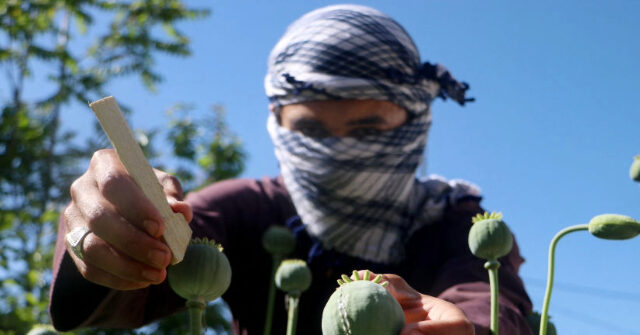President Donald Trump submitted a “Presidential Determination” document to Congress on Monday that identified 23 nations – including Afghanistan, India, China, Venezuela, and Pakistan – as major producers of illegal drugs, or important transit points on the drug supply pipeline.
The full list of 23 nations included Afghanistan, The Bahamas, Belize, Bolivia, Burma, China, Colombia, Costa Rica, the Dominican Republic, Ecuador, El Salvador, Guatemala, Haiti, Honduras, India, Jamaica, Laos, Mexico, Nicaragua, Pakistan, Panama, Peru, and Venezuela.
The document noted that a country’s inclusion on the list “is not necessarily a reflection of its government’s counterdrug efforts or level of cooperation with the United States.”
“The reason countries are placed on the list is the combination of geographic, commercial, and economic factors that allow drugs or precursor chemicals to be transited or produced, even if a government has engaged in robust and diligent narcotics control and law enforcement measures,” the document explained.
President Trump’s determination went on to identify several countries that have “failed demonstrably during the previous 12 months to both adhere to their obligations under international counternarcotics agreements,” including Afghanistan, Bolivia, Burma, Colombia, and Venezuela, “and to take the measures required by section 489(a)(1) of the FAA.”
The document made the case for treating illegal drug operations as a threat to American national security, “including a public health crisis in the United States that remains the leading cause of death for Americans ages 18 to 44.”
“More than 40 percent of Americans know someone who has died from an opioid overdose, and in 2024 the United States averaged over 200 deaths daily due to illicit drugs,” the presidential determination pointed out.
Trump said he has taken effective steps against the threat of illicit drugs, including securing America’s borders “using the full range of law enforcement and military resources necessary,” marshaling American economic strength to “compel greater cooperation from our North American neighbors to confront the drug threat,” and pressing the People’s Republic of China (PRC) for greater cooperation against fentanyl producers.
“For the first time in 4 years, our border is no longer an open sieve for drug terrorist cartels, human traffickers, and all others who would do our country harm,” Trump said, taking a sharp dig at his predecessor, Joe Biden.
Trump also threw some elbows by making it clear that when he spoke of using American economic strength to secure “greater cooperation from our North American neighbors,” he meant Canada and Mexico. He applauded Canadian Prime Minister Mark Carney and Mexican President Claudia Sheinbaum for responding to his demands.
Trump offered no applause for Colombia, Venezuela, Bolivia, and Afghanistan, excoriating each for not doing enough to crack down on illegal drugs.
“In Colombia, coca cultivation and cocaine production have surged to all-time records under President Gustavo Petro, and his failed attempts to seek accommodations with narco-terrorist groups only exacerbated the crisis,” Trump said.
“Under President Petro’s leadership, coca cultivation and cocaine production have reached record highs while Colombia’s government failed to meet even its own vastly reduced coca eradication goals, undermining years of mutually beneficial cooperation between our two countries against narco-terrorists,” he added.
Trump dismissed Venezuelan dictator Nicolás Maduro as an “indicted drug trafficker” who runs “one of the largest cocaine trafficking networks in the world.” Maduro was indicted by the United States for trafficking in 2020. The Justice and State Departments doubled the bounty for his arrest to $50 million in August 2025.
Trump took a softer touch with Bolivia, which he said has “taken some positive steps to increase cocaine seizures and to work with United States law enforcement to bring drug criminals to justice” after a poor performance last year.
Trump blasted the Taliban junta in Afghanistan for ostentatiously vowing to crack down on the opium trade in accordance with Islamic law, but instead merely swapping opium poppies for methamphetamines.
“Some members of the Taliban continue to profit from this trade, and I am once again designating Afghanistan as having failed demonstrably to uphold its drug control obligations given the serious threats to United States interests and international security,” Trump said.
Read the full article here


